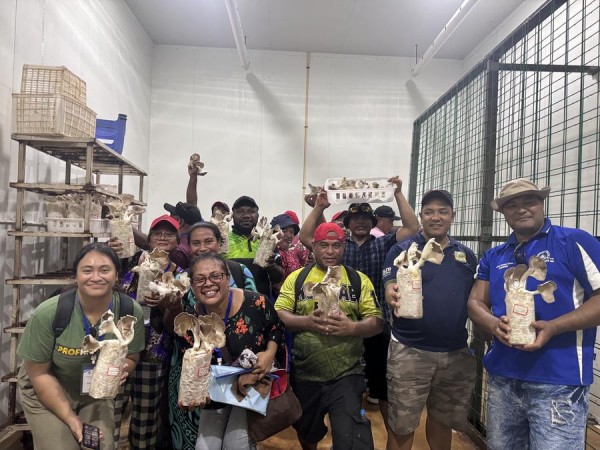China's Juncao technology empowers Nauruan communities' climate-resilient livelihoods

Participants of a training course on Juncao technology for Pacific Island countries pose for a photo with mushrooms cultivated using Juncao ingredients in Nadi, Fiji, Feb. 28, 2024. [China-Fiji Juncao Technology Demonstration Center/Handout via Xinhua]
"I believe that adopting Juncao technology in Nauru would be highly beneficial for our country," said a Nauruan agricultural official.
BEIJING -- The Pacific island nation Nauru signed up for the Belt and Road Initiative on Monday.
Since China and Nauru restored diplomatic ties earlier this year, bilateral win-win cooperation has rapidly expanded, yielding beneficial outcomes for local communities.
Being a Pacific island nation, Nauru is struggling to cope with such pressing challenges as rising sea levels and land erosion brought about by climate change. Worse still, the meager resources of fresh water for daily life are a persistent concern for local residents.
Due to its unfavorable natural conditions for cultivation, Nauru heavily relies on imports of agricultural products, vegetables and fruits, resulting in high prices in the market, said Joanna Olsson, director of the Government Information Office of Nauru.
Juncao, a hybrid grass developed by Chinese scientists as a major multi-functional agricultural resource, offers a feasible resolution to these woes. Translated literally as mushroom grass, Juncao can be used for mushroom farming, or as livestock forage and poultry feed, and a green barrier to forestall desertification.
When working in East China's Fujian province more than two decades ago, Xi Jinping introduced the Juncao technology to a visiting provincial governor from Papua New Guinea, another island nation in the Pacific, marking the beginning of international cooperation on Juncao technology.
Having taken root in over 100 countries and regions around the globe, Juncao has been hailed by the locals as the "Chinese grass" or "grass of happiness."
Last month, Hess-Tekai Foilape, an agricultural extension officer for Nauru's Department of Environment, Management and Agriculture, became the first person from Nauru to attend a Juncao technology training course held by Chinese scientists in Fiji.
"I believe that adopting Juncao technology in Nauru would be highly beneficial for our country. Potential impacts include improved food security, increased resilience to climate change, and enhanced economic opportunities through the development of new industries," Foilape told Xinhua.

Follow us on WeChat
京ICP备18041594号-1
京公网安备 11010202005508号

Follow us on WeChat


